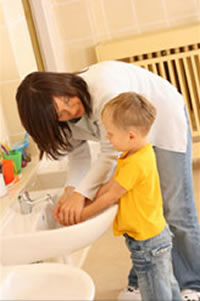Article at a Glance
• Contact your school or childcare provider to learn about policies concerning sick children and hygiene.
• Ask questions about immunizations, how they prevent the spread of illness, and what they do to promote good hygiene.
Childcare, school, sports, parks, toddler classes, and after-school activities place our children in contact with a dizzying array of other youngsters. While the social exposure may be good for them, it also exposes our children to a wide range of diseases and infections. When you’re with them you can keep up on the hand washing and hygiene, but what do you do when you can’t be there?
Most parents do quite a bit of research before selecting a childcare facility or after-school program. When going through your interrogation list, don’t be afraid to ask questions about their policies concerning sick children and hygiene. Here are a few good questions to add to your list:
Is everybody up to date on recommended immunizations?
It is important that childcare providers and other children in the facility receive all recommended immunizations, including flu shots.
What is the policy if your child becomes sick?
Find out how sick your child needs to be before they call you or send your child home. Some schools will contact you right away if your child shows symptoms of even a mild illness. Other schools allow children to stay at the facility as long as they don’t have a fever. In case your child does become sick, make sure you have a backup childcare plan.
What do they do to lower the chances of your child being exposed to a contagious illness?
Some childcare facilities send children home, while others have a trained staff member who can take care of sick children in a separate room away from other children. Whatever their policy, make sure it works for you and that there is a plan in place that prevents sick children from infecting others.
Is the facility equipped to handle noncontiguous illnesses?
If your child has an ear or urinary tract infection, you will need to make sure there is somebody on hand to help administer any medication. This also is true for any medical problems like asthma or severe allergies that require medication.
Does the facility promote good hygiene?
• Are there plenty of sinks for hand washing?
• Do children and caregivers wash their hands regularly, including before and after handling food, when they go to the bathroom, change a diaper, go outside, blow a nose, tend to a cut or sore, or after handling trash cans?
• Is food preparation done in an area separate from toilets and diaper-changing tables?
• Are the sinks and toilets clean?
• Are toys for infants and toddlers sanitized before others play with them?
• Are toys and equipment disinfected at least once a day?
• Is food, including breast milk, stored properly?
For More Information:
Preventing the Spread of Illness
